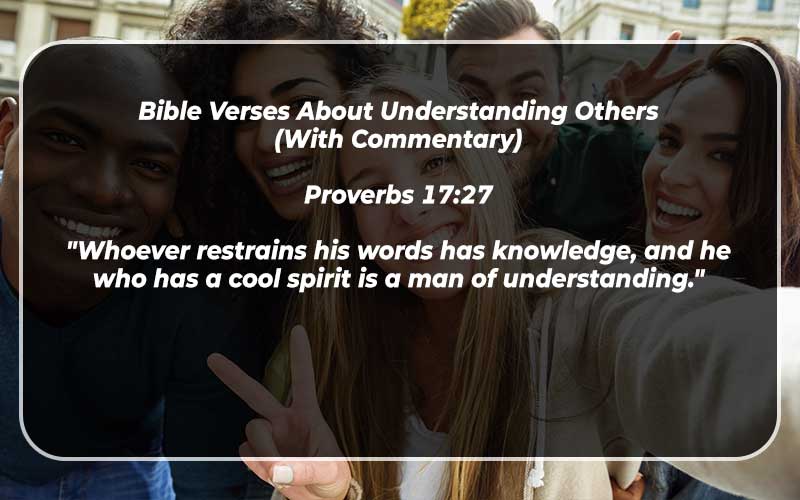Understanding others is a fundamental aspect of human connection and empathy. It involves the ability to grasp different perspectives, acknowledge diverse experiences, and cultivate a compassionate awareness of people’s thoughts and emotions. In the context of biblical teachings, understanding others aligns with the principles of love, kindness, and respect emphasized throughout the Scriptures.
The following Bible verses, accompanied by extended explanations, provide insight into the importance of understanding others, offering guidance on how to navigate relationships with empathy, humility, and a Christ-like spirit.
Bible Verses About Understanding Others
Proverbs 2:6:
“For the Lord gives wisdom; from his mouth come knowledge and understanding.”
True understanding begins with seeking wisdom from the Lord, acknowledging that divine guidance is essential in comprehending the complexities of human relationships.
1 Corinthians 13:1:
“If I speak in the tongues of men and of angels but have not love, I am a noisy gong or a clanging cymbal.”
Love is foundational to understanding others. Without genuine love, even eloquence becomes noise. It underscores the need for a compassionate and caring attitude in our interactions.
Philippians 2:3:
“Do nothing from selfish ambition or conceit, but in humility count others more significant than yourselves.”
Humility is key to understanding others. When we prioritize others above ourselves, we open our hearts to their experiences, fostering a deeper connection.
James 1:19:
“Know this, my beloved brothers: let every person be quick to hear, slow to speak, slow to anger.”
Listening is a foundational element of understanding. Being quick to listen, slow to speak, and slow to anger cultivates an atmosphere where understanding can thrive.
Colossians 3:12:
“Put on then, as God’s chosen ones, holy and beloved, compassionate hearts, kindness, humility, meekness, and patience.”
The virtues listed here, including compassion and kindness, are essential in understanding others. They create an environment where empathy can flourish.
Galatians 5:22-23:
“But the fruit of the Spirit is love, joy, peace, patience, kindness, goodness, faithfulness, gentleness, self-control; against such things there is no law.”
The fruits of the Spirit, including kindness and gentleness, guide believers in their interactions, fostering an atmosphere of understanding and mutual respect.
Ephesians 4:32:
“Be kind to one another, tenderhearted, forgiving one another, as God in Christ forgave you.”
Kindness and forgiveness are interconnected with understanding. A tender and forgiving heart creates space for empathy and reconciliation.
Romans 12:16:
“Live in harmony with one another. Do not be haughty, but associate with the lowly. Never be wise in your own sight.”
Harmony in relationships is achieved when we associate with humility and avoid an arrogant mindset. True understanding thrives in an atmosphere of mutual respect.
Proverbs 18:2:
“A fool takes no pleasure in understanding, but only in expressing his opinion.”
Understanding involves a willingness to seek insights beyond one’s opinions. The wise prioritize comprehension over the mere expression of their views.
Matthew 7:12:
“So whatever you wish that others would do to you, do also to them, for this is the Law and the Prophets.”
The Golden Rule encourages a reciprocal understanding—treating others as we desire to be treated fosters empathy and compassion.
1 Peter 3:8:
“Finally, all of you, have unity of mind, sympathy, brotherly love, a tender heart, and a humble mind.”
Unity of mind, sympathy, love, and humility are foundational to understanding others. They pave the way for compassionate connections.
Proverbs 15:1:
“A soft answer turns away wrath, but a harsh word stirs up anger.”
Soft responses diffuse tension and create an environment conducive to understanding. Harsh words, on the other hand, hinder meaningful communication.
Galatians 6:2:
“Bear one another’s burdens, and so fulfill the law of Christ.”
Understanding is demonstrated through bearing each other’s burdens. It involves walking alongside others in their joys and sorrows.
1 Corinthians 10:24:
“Let no one seek his own good, but the good of his neighbor.”
Selflessness is a precursor to understanding. Prioritizing the well-being of others contributes to building bridges of empathy.
Romans 15:1-2:
“We who are strong have an obligation to bear with the failings of the weak and not to please ourselves. Let each of us please his neighbor for his good, to build him up.”
Bearing with the weaknesses of others and seeking to build them up reflects a heart inclined toward understanding and support.
Luke 6:31:
“And as you wish that others would do to you, do so to them.”
Reiterating the Golden Rule, this verse emphasizes the reciprocity of understanding—our actions influence the dynamics of mutual comprehension.
Proverbs 17:27:
“Whoever restrains his words has knowledge, and he who has a cool spirit is a man of understanding.”
Exercising restraint in speech and maintaining a calm demeanor are indicative of a person with understanding. It promotes thoughtful communication.

1 Thessalonians 5:11:
“Therefore encourage one another and build one another up, just as you are doing.”
Encouragement is a powerful tool in fostering understanding. It creates an atmosphere where individuals feel valued and supported.
James 3:17:
“But the wisdom from above is first pure, then peaceable, gentle, open to reason, full of mercy and good fruits, impartial and sincere.”
The characteristics of heavenly wisdom, including being open to reason and full of mercy, guide believers in understanding others with a Christ-like perspective.
Ephesians 4:2:
“With all humility and gentleness, with patience, bearing with one another in love.”
Humility, gentleness, and patience are essential components of understanding. They create a framework for navigating differences with grace.
1 Corinthians 8:1:
“Now concerning food offered to idols: we know that ‘all of us possess knowledge.’ This ‘knowledge’ puffs up, but love builds up.”
Knowledge without love leads to pride. Understanding others is a process rooted in love, which builds bridges rather than erecting barriers.
1 John 4:7:
“Beloved, let us love one another, for love is from God, and whoever loves has been born of God and knows God.”
Love is the foundation of knowing and understanding God. It naturally extends to our interactions with others, fostering mutual comprehension.
Galatians 5:13:
“For you were called to freedom, brothers. Only do not use your freedom as an opportunity for the flesh, but through love serve one another.”
Freedom in Christ is expressed through love and service to one another. Understanding flourishes in an environment of selfless service.
Matthew 5:9:
“Blessed are the peacemakers, for they shall be called sons of God.”
Peacemaking involves understanding different perspectives and seeking reconciliation. It reflects the character of God’s children.
1 Thessalonians 5:14:
“And we urge you, brothers, admonish the idle, encourage the fainthearted, help the weak, be patient with them all.”
The multifaceted nature of understanding is exemplified in admonishing, encouraging, and helping others with patience—a holistic approach to compassionate interaction.
Also Read: Bible Verses For The Heart (With Commentary)
Bible Verses About The Heart Of A Woman (With Commentary)

